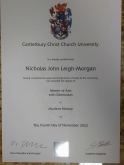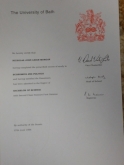

Nick Leigh-Morgan - Tutor in London
| Institution | Town | Speciality | Degree | Class |
|---|---|---|---|---|
| University of Bath | Bath | Economics and Politics | Bachelor | 2:1 |
| Canterbury Christchurch University | Canterbury | Modern History | Master | Distinction |
I have written 6 GCSE history text books as well as 2 exam technique guides. I have also written an A-level text book with a second one to be published shortly as well. My main areas of academic expertise are in the following modules for GCSE. The first three I have authored textbooks for: ● Germany: (including the very popular Weimar to Hitler module) For A-level (I have nearly completed an A-level textbook for the France in revolution modules and written one for the Russia modules): ● Modern Britain (20th century) I may be able to tutor you on other modules, depending on what they are. I have also tutored politics as well and have written 2 x 15 page help guides on Conservatism and Socialism which I can give to any student free of charge. The most important thing from your tutor is that they know the subject inside out and having written 6+ books I can give all my students the kind of depth of tuition needed to get the very top grades at both GCSE and A-level. Tutoring Experience I love history and politics and after 25 years in the corporate sector I moved into teaching. I taught history and economics recently in a private school in Hampshire, teaching at both GCSE and A-level before focusing on authoring school text books and online tutoring.
What's the best way to learn? Firstly, let's make the tutorials enjoyable and to guarantee that I use the active learning style of teaching. There's nothing worse than just being lectured to for 50+ minutes so all the lessons are focused on the student engaging with cartoons, photos, paintings, speeches and letters written at the time of the topic being covered. Learning by reviewing primary source material is such a great way to get student engagement and make it a productive and enjoyable experience for them. So the most productive tutor sessions are divided into 3 segments: the first involves myself and the student discussing a topic from the curriculum, usually something they have studied in class recently. Typically I will regularly question the student on that subject matter to check understanding, typically for 25 minutes and that segment of the lesson will typically revolve around the student learning through analysing primary source material. Then the second part of the lesson would see the student answering a question related to that topic taken from an exam paper but I would work with the student leading them towards the optimal answer. Finally the student would then answer a second question but it would be the student leading the discussion explaining how they would answer it. So the lesson is scaffolded as the student gradually does more of the work, such that by the end, they are leading the discussion.
|






